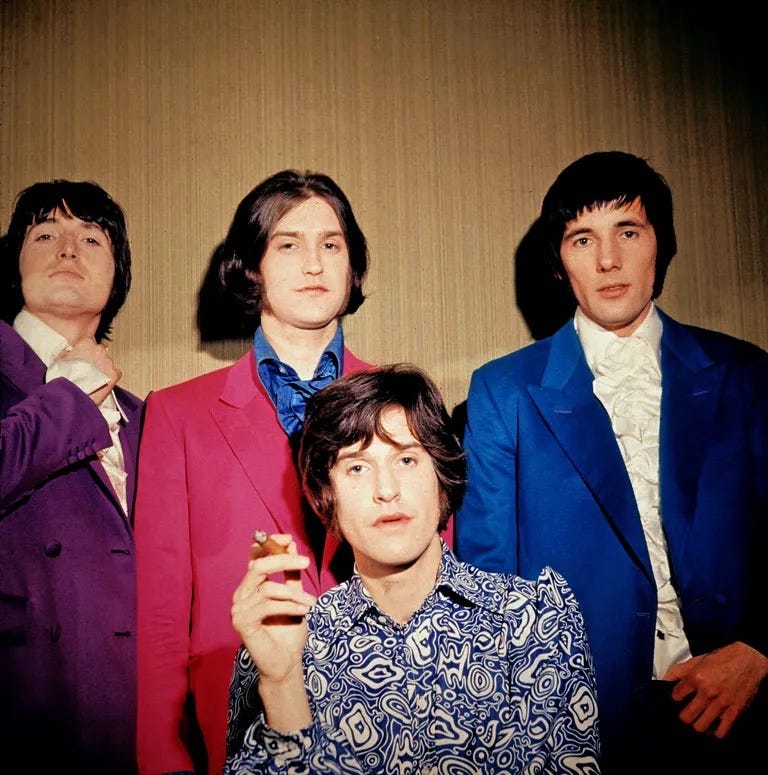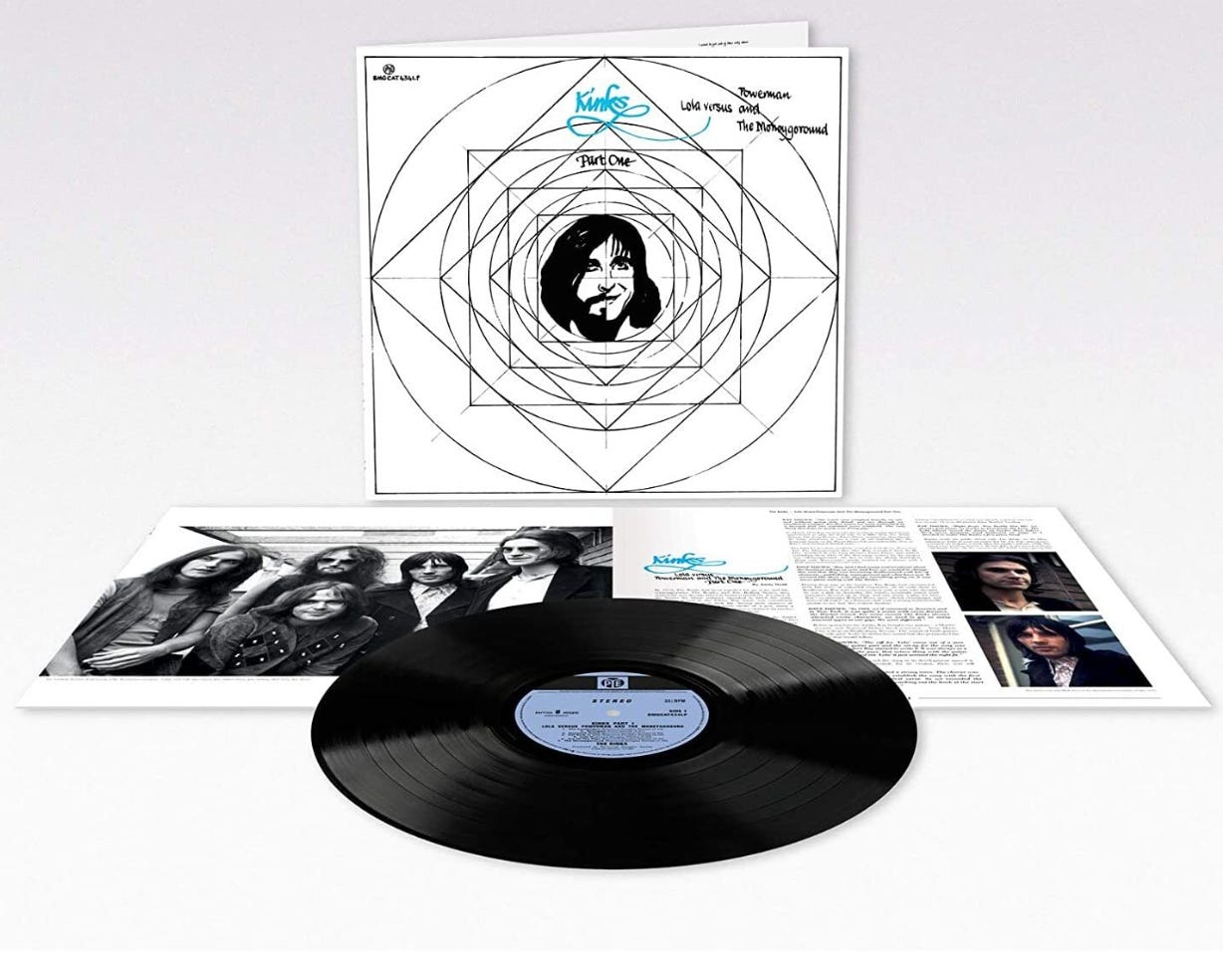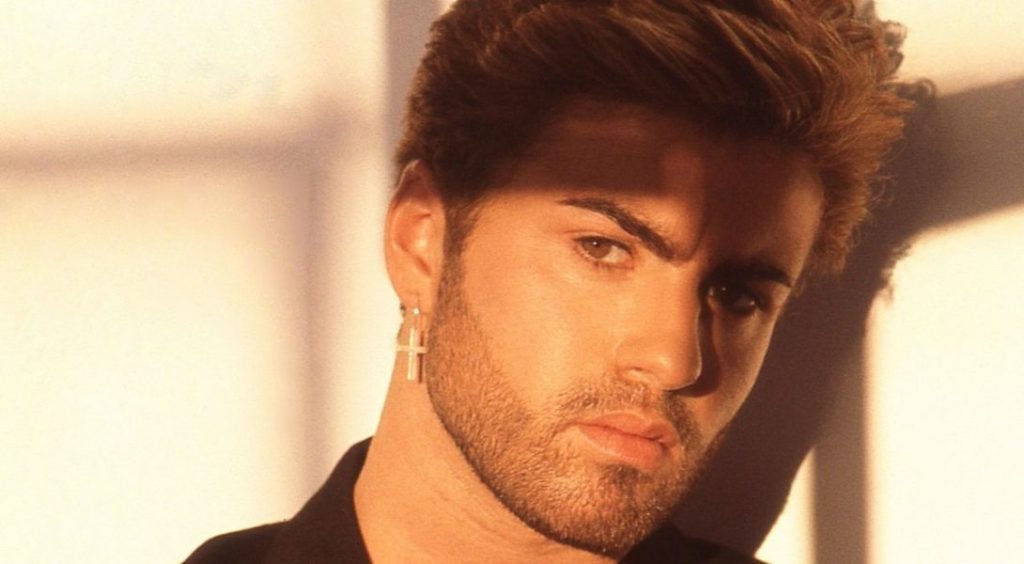"Lola" - The Kinks
On Trans Visibility
Where are we as a society that a 53-year-old song is still our most famous trans anthem?
In 1970, one year after the Stonewall uprising and before any Pride parade had ever marched, Ray Davies wrote an endearing story about a young man and his first kiss with a woman who also happened to be transgender.
Famed trans activist Mara Keisling was an 11-year-old kid in central Pennsylvania who heard that pop song on the radio, and it literally saved her life. There were almost no “out” trans celebrities. Christine Jorgensen and Jackie Shane were trailblazers decades earlier, but it sure felt like there were no signs of trans visibility in the suburbs. So when Keisling first heard “Lola” by the Kinks, she suddenly felt less alone. “It was pretty clear that ‘Lola’ was like me,” Keisling said in an NBC News interview. “It made me realize I wasn’t absolutely the only person in the world living with what was then a shameful secret.”
Keisling became the founding executive director of the National Center for Transgender Equality. “This song was one of the things that got me through,” said Keisling. “That sounds odd, but when you’re a kid and that alone, and you have that kind of thing weighing on you, and you can’t talk to anybody about it, a song like ‘Lola’ becomes so important. It was lifesaving.”
The lyrics were written by the Kinks’ lead singer, Davies, a straight, white, cisgender man. By today’s standards, some of the lyrics are offensive. No one should get away with a line like “She walks like a woman but talks like a man,” but in 1970, there was hardly a template for a cis person to describe a trans woman. Davies creates a naive character who has “never ever kissed a woman before,” and Lola, a Black, trans woman will be his first. A music video created years later doesn’t acknowledge Lola as Black, but in a song known for visibility, we can’t forget that “dark brown voice:”
She walked up to me and she asked me to dance
I asked her her name and in a dark brown voice she said Lola
L-O-L-A, Lola
The boy eventually discovers Lola’s identity:
I pushed her away
I walked to the door
I fell to the floor
I got down on my knees
Then I looked at her and she at me
Even during his knee-jerk reaction, he doesn’t misgender Lola. He doesn’t run away or dehumanize her. He realizes that Lola is perfect. And he admits all the reasons he doesn’t exactly fit traditional expectations of gender either:
“I’m not the world’s most physical guy.”
“She picked me up and sat me on her knee.”
“I’m not the world’s most masculine man.”
Then, there is the song’s most powerful line:
Girls will be boys and boys will be girls.
It’s a mixed-up, muddled-up, shook-up world except for Lola.
The word “except” here is important. The world is “mixed-up,” but not Lola. This judgey world they live in is shook-up, not “my” Lola.
The song was groundbreaking in 1970 for depicting the love between a Black trans woman and a white cis man. When “Lola” was released as a single, some radio stations refused to play the song or would fade out the track before Lola's gender identity was revealed.
In a Record Mirror article with the tabloid title, "Sex Change Record: Kink Speaks," Davies addressed the controversy, saying, "It really doesn't matter what sex Lola is, I think she's alright.”
Davies’ brother and fellow bandmate, Dave Davies, who has always been open about being bisexual, said he’s proud of the legacy that “Lola” has in music history. “Obviously, there were a lot of people we knew who were transgender at the time, and we knew a lot of gay people, but you have to remember, when the Kinks first started, homosexuality was illegal in England.”
“Lola” rose to the top of the Billboard charts in both the UK and in America. In a recent New York Times interview, Ray Davies said he’d heard that “Lola” encouraged other songwriters to explore this topic. “Before he passed away, Lou Reed told me that ‘Lola’ was a big influence on him,” he said. “It was reassuring to him when he did ‘Walk on the Wild Side’ in 1972.”
Arguably, “‘Lola” along with Lou Reed’s 1972 hit “Walk on the Wild Side,” spent 50 years as the most commercially popular songs about trans visibility. Some will remember “I’m A Boy,” written by bisexual guitarist Pete Townshend from the Who, which went to No. 2 in the UK in 1966 but didn’t make the charts in the states.
Although there have been successful trans musicians through the years like Sophie, Laura Jane Grace (from Against Me!), and Anohni (from Antony and the Johnsons fame), no one was able to match the level of success until 2022 when Kim Petras and Sam Smith made history as the first transgender and nonbinary artists to reach No. 1 on the Billboard chart with their hit, “Unholy.”
Davies would explore another transgender character in the Kinks’ 1977 hit, “On The Outside,” about a person struggling to accept their identity. “It’s about somebody going through a tremendous emotional trauma about having to be somebody they know they’re not,” he said.
For a trans kid like Keisling, this Billboard-topping hit had infiltrated suburbia and found its way to people desperate for visibility and acceptance. “This is one of the first cracks in the gender revolution,” explains Natalie Egan, a transgender woman interviewed by NBC News. “It presented us in a way that was not negative. It’s truly pioneering, and it’s remarkable that the Kinks found the courage to put it out.”
What’s your experience with this song? Leave a comment below!
It’s so easy when know the rules. It’s so easy, all you have to do is…
Choose the original name of the band before it was changed to “The Kinks.”
a) The Ravens
b) Sex Shoppe
c) Ape Men
d) The Villagers
(Scroll to the bottom for the answer.)
And you’re a material girl.
Welcome to our merch store! Every week, we’ll offer some cool swag based on the artist from each issue.
50% of all sales will be donated to the National Center for Transgender Equality.
Quiz Answer: It’s A, the Ravens. The band was called that until around 1964. Before signing with Pye Records, the band replaced their drummer, Mick Avery, and renamed themselves the Kinks.
Did you catch last week’s issue?
No.8 - "Freedom!'90"- George Michael
Welcome to Songs That Saved Your Life - a weekly newsletter on rock n roll history written from a queer lens. Quick Disclaimer for Pride Month Only! Paid subscriptions help us continue to publish queer stories like this one. We love our readers and know it’s annoying to have to solicit for money. We promise that we’ll only ask you to upgrade to a paid a…










This is wonderful! and a wonderful song. It's very interesting indeed!
Now imma have this stuck in my head all day...
This is a great read!
I have always really liked this song, and while I knew what it was about, your piece really digs into the depths of the songs meaning in a way that helped shed even more light on it for me. Thank you